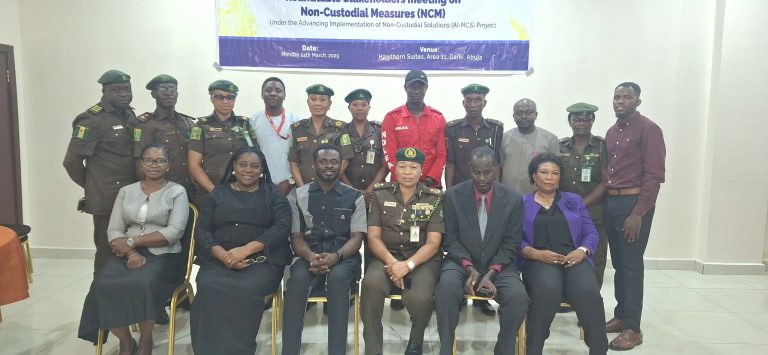The Prisoners’ Rehabilitation and Welfare Action (PRAWA) has urged greater awareness and increased adoption of non-custodial measures to reduce overcrowding in correctional facilities across Nigeria.
The call was made during a roundtable stakeholders’ meeting on non-custodial measures held on Monday in Abuja. The event was organized by PRAWA in collaboration with the Nigeria Correctional Service (NCoS) and supported by the Rule of Law and Anti-Corruption (RoLAC) programme.
In her address, Dr. Uju Agomoh, Executive Director of PRAWA, highlighted the negative impacts of custodial sentencing, including separation from family, exposure to hardened criminals, and long-term social repercussions for offenders.
Agomoh stressed the importance of identifying gaps in the implementation of non-custodial sentences and building on past efforts to improve the system. She emphasized that alternatives such as community service, probation, and restorative justice could significantly reduce the number of inmates in correctional centres, especially in urban areas.
Although correctional centres in rural areas are less congested, full implementation of non-custodial measures is necessary to ease overcrowding in urban facilities,” Agomoh said.
Agomoh noted that the NCoS Act 2019 provides a legal foundation for implementing non-custodial measures. She referenced Rwanda’s post-genocide approach, which integrated traditional justice mechanisms to rehabilitate offenders within the community.
She also stressed that non-custodial measures should maintain accountability, ensuring that offenders take responsibility for their actions while facing appropriate penalties.
Deputy Controller of Corrections in charge of Non-Custodial Services, Onyinyechi Okoro, reinforced the need to strengthen alternative sentencing.
“Minor offences and light sentences should not automatically result in incarceration. This will help reduce overcrowding and improve rehabilitation outcomes, Okoro stated.
In his goodwill message, the Attorney General of the Federation (AGF) and Minister of Justice, Lateef Fagbemi, SAN, reiterated the government’s commitment to supporting PRAWA and other stakeholders in promoting non-custodial measures.
Fagbemi, represented by Yusuf Abdullahi, a Deputy Director at the Ministry of Justice, highlighted that non-custodial measures encourage restorative justice, benefiting both offenders and victims while reducing government spending on prison maintenance.
Other stakeholders at the meeting called for a more structured approach to enforcing non-custodial sentences under Section 37(1) of the NCoS Act 2019, which provides for community service, probation, and parole as alternatives to imprisonment.
They also emphasized the need for stronger collaboration among the judiciary, law enforcement agencies, and civil society to ensure broader adoption and effective implementation of non-custodial measures.
This initiative reflects ongoing efforts to reform Nigeria’s criminal justice system, reduce prison overcrowding, and promote more effective rehabilitation of offenders.



